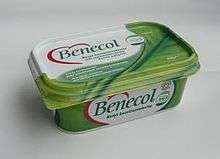Benecol

Benecol is a brand of cholesterol lowering food products owned by the Finnish company Raisio Group, which owns the trademark.
Raisio Group licenses the Benecol brand and sells the ingredient stanol ester to food companies around the world. The brand is licensed in more than 30 countries by local food companies such as Kaiku in Spain, Colanta in Colombia, Lotte in Korea and Kalbe Nutritionals in Indonesia. [1]
Effects on health
The European Commission approved the following statement regarding Benecol products: "Plant stanol esters have been shown to lower/reduce blood cholesterol. Blood cholesterol lowering may reduce the risk of coronary heart disease" but noted that "there are no studies demonstrating that plant stanol esters have an impact on population-based CHD morbidity and mortality rates".[2]
The National Institute for Health and Clinical Excellence of England and Wales similarly found that while "[t]here is evidence that foods containing plant sterols and stanols reduce cholesterol levels", the government body concludes that "there is not enough evidence at the moment that these products prevent cardiovascular disease."[3]
Effects on cholesterol
The European Commission has authorised that an LDL-cholesterol lowering effect of 7 - 10% can be achieved in 2–3 weeks by a daily intake of plant stanol esters equivalent to 1.5 – 2.4 g of plant stanols in an appropriate food.[2]
Consuming more than 3g of plant stanol per day is not recommended and Benecol foods may not be appropriate for pregnant or breast feeding women, and children under 5 years old.[4]
There are over 70 clinical studies proving that plant stanol ester lowers cholesterol levels.[5] [6] [7]
Benecol foods have been found as a way to reduce cholesterol[8] and they also can help lower cholesterol in people that are taking statins.[9] However, it is important that those already taking cholesterol lowering medication consult with their GP (Primary Care Physician) before embarking on dietary cholesterol programmes.
The review, published in European Journal of Clinical Nutrition, in January 2009 listed plant stanol ester among the ten greatest discoveries related to nutrition during the past 30 years.[10] The discoveries chosen were based on the views of the world's leading nutrition researchers and solid research data.
About the products
The first Benecol product was a spread that was brought to market in Finland in 1995. Since then, the product line has expanded to fat spreads, yogurts, yogurt drinks, cream cheese style spreads, milk and soy drinks, bread and oatmeal. The availability of different products varies in different countries.
Yogurt Drinks Each bottle contains 2g of cholesterol lowering plant stanols. Benecol Yogurt Drinks are available in a number of different flavours and also includes a Dairy Free Fruit and Soya variety.
Spread Benecol spread, as marketed in Finland, is a product containing 32% fat. The main source of fat is rapeseed (canola) oil. Later varieties of Benecol spread in the UK include Olive Spread (55% fat), Buttery Taste Spread (63% fat) and Light Spread (35% Fat).
Yogurts Low fat bio yoghurts are available in a range of different flavours. In the UK and Ireland, each yogurt has 1 serving of Benecol (0.8g plant stanols). Outside of the UK and Ireland, each yogurt contains 2g of plant stanols.
Cream Cheese Spread 20g, or 4 level teaspoons of Benecol Cream Cheese Style Spread, equals one serving (0.8g of plant stanols).
Bread 4 slices of Dobrogea Benecol Rye Bread contains the daily intake of 2g of plant stanols.
See also
References
- ↑ Food navigator.com (2008-03-14). "Yearly results raise Raisio expectations". Retrieved 2008-04-08.
- 1 2 European Food Safety Authority (2008). "Plant Stanol Esters and Blood Cholesterol" (PDF). p. 2–2. Retrieved 2011-03-05.
- ↑ Hope, Jenny (2008-05-31). "Low-cholesterol spread 'not certain to cut heart risks', GPs told". Daily Mail. London.
- ↑ "Serving Guide, Benecol Website".
- ↑ Law, M. (2000). "Plant sterol and stanol margarines and health". p. 861-864. Retrieved 2011-03-05.
- ↑ Miettinen; et al. (1995). "Reduction of serum cholesterol with Sitostanol-Ester Margarine in a Mildly Hypercholesterolaemic Population with mildly elevated cholesterol". p. 1308–1312. Retrieved 2011-03-05.
- ↑ Katan; et al. (2003). "Efficacy and Safety of Plant Stanols and Sterols in the Management of Blood Cholesterol Levels". Mayo Clin. Proc. 78 (8): 965–78. doi:10.4065/78.8.965. PMID 12911045.
- ↑ Martikainen, JA.; et al. (2007). "Plant stanol esters are potentially cost-effective in the prevention of coronary heart disease in men: Bayesian modelling approach.". Eur J Cardiovasc Prev Rehabil. 14 (2): 265–72. doi:10.1097/01.hjr.0000216550.74258.12. PMID 17446806.
- ↑ Blair, S.; et al. (2000). "Incremental reduction of serum total cholesterol and low-density lipoprotein cholesterol with the addition of plant stanol ester-containing spread to statin therapy". p. 46–52. Retrieved 2011-03-05.
- ↑ Katan; et al. (2009). "Which are the greatest recent discoveries and the greatest challenges in Nutrition? Eur J Clin Nutr". p. 2-10.